Does Final Fantasy 7 Remake have any appeal to players without any nostalgia for the original?
Is Square Enix building Final Fantasy 7 Remake to appeal to brand new players? We sent one to find out
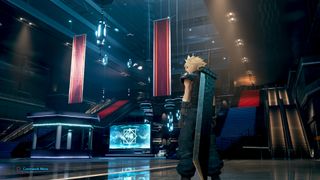
Last week I had the pleasure of attending a preview event for Final Fantasy 7 Remake where I played through three hours of the game's early chapters. Walking into the venue, I watched as several attendees (their faces beaming with glee) held a replica of Cloud's gigantic, deeply impractical buster sword, an image that had been burned into my memory since the Y2K era. Growing up, I knew from forum signatures and Linkin Park AMVs that the spiky-haired boy was influential, but I never understood the context. Final Fantasy 7 came out when I was two years old, which meant that I grew up on a diet of games that it influenced but never the original.
Kingdom Hearts? I'm an expert. Nowadays, I'd love nothing more than to bask in the luscious aesthetic of Tetsuya Nomura's streetwear inspired character designs. Cloud's baggy pants and buckles, the utility-focused, leather-strapped ensembles of the Lucis Caelum crew – they ooze cool out of every texture. In that sense, I've always wanted to appreciate the provenance of their fascinating fashion, but the blind spot in my back catalogue remains.
This is why I've been curious about the game ever since its reveal. It's easy to get lost in the hype generated by those fans who are ready to see Square realise the true vision of something very dear to them from a formative point in their life – not to mention that Final Fantasy 7 is widely thought of as one of the greatest and most influential games of all time. But what if you've never played it, is Final Fantasy 7 Remake worth jumping into or is the core of the game caught in time?
A fresh perspective
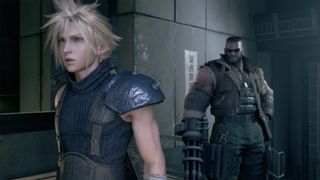
If you're a fan of games like Final Fantasy 15, Kingdom Hearts 3, and JRPGs with more active battle systems like Tales of Vesperia and Nier Automata, you should feel comfortable with the combat in Final Fantasy 7 Remake, but get ready for a pleasant and somewhat challenging surprise.
The ATB system in the game is an amalgamation of all of the above, blending fast-paced hack and slash combat with careful management of menus, meters and limit breaks, asking you to swap between disparate characters and perform spells and abilities to stagger and expose your enemies before you can deal true damage, like breaking a foe's posture in Sekiro.
In Final Fantasy 7 remake, I found that fights aren't choreographed into turn-based arenas with a defined beginning and end as they were in the JRPGs of the late 90s – they happen naturally in the environment. Maps feel open and worthy of exploration with Materia (gems for upgrading your weapons) scattered in dank alleyways and behind puzzle-locked doors.
The game urges you to soak in the neon signs and smell the acid rain until things turn sour and henchman start dropping from helicopters, forcing Cloud to scuttle up fire escapes and brandish his buster. Later in the demo I was startled by dormant anthropomorphic machines breaking free of their chains and lunging at my party in the depths of a reactor. With this engaging approach it skilfully evades the pitfalls of more linear JRPGs and beyond mechanicals, the mob design in Final Fantasy 7 Remake proves to be wonderfully varied. The game seamlessly weaves whimsical creatures like spirits and plants into a world full of brutal architecture and grimy Y2K aesthetics.
Sign up to the GamesRadar+ Newsletter
Weekly digests, tales from the communities you love, and more
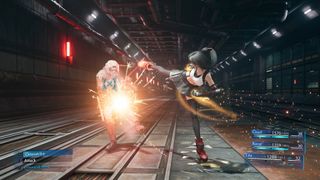
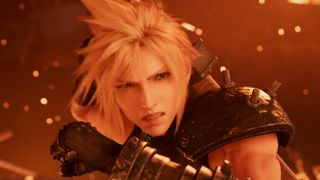
Final Fantasy 7 Remake preview hands-on: We sent a FF7 expert to play the latest build of the game, and they say that it's the perfect blend of old and new
On Normal difficulty, I found that Final Fantasy 7 Remake provides a serious challenge and is a lot more tactically inclined than you might think, differentiating itself from the more spam-happy combat in games like Kingdom Hearts. When facing one of the demo's more vicious bosses, the Air Buster, I had to think about its weaknesses and counteract them in a manner akin to Persona.
In between dodging laser beams I was using electricity spells and Cloud's eco-terrorism partner Barrett's ranged attacks to cut the mechanical beast down a peg when it hovered out of range of Tifa's deadly punches. Beyond my efforts in battle, the prelude to the boss fight had me finding keycards and making choices – should I remove parts of its programming to slow its speed or hamper its missile stock?
This ambitious approach is benefitted by how satisfying it feels to swap between your party members at will as their special abilities charge and wane. It allows you to create exciting mid-air combos by telling Tifa to uppercut a goon with a button press before unleashing a menu ability with Cloud, sending the poor sap hurtling into the rubble with his blade. It feels slick and succeeds in making you think about your enemy as an equal rather than a pushover, turning the more lengthy battles with bigger beasts into Monster Hunter-esque brawls to the death. As the orchestra adds sonic weight to your strongest attacks, it soon becomes clear that Sora's haphazard keyblade whacks won't save you here.
The hack and slash influence is plain to see with different 'Operator' and 'Punisher' modes for Cloud's standard attacks, a charging system for Barret's gun blasts and Tifa's satisfying flurry of fists. Even the more support-focused Aerith proved devastating in the sewers of Midgar with bullet hell bolts of magic available to be unleashed from afar onced charged into her staff. Out of the core cast, no party member feels like dead weight dragging down the combat.
A welcomed surprise
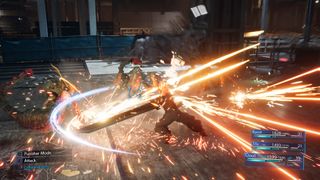
There's a nuance and challenge to Final Fantasy 7 Remake that gives it a staunchly old-school feel. It felt like picking up a daunting novel but being enthralled by its opening chapter, one that provides a lot of 21st century catharsis to the wave of millennials (myself included!) gearing up to engage with it for the first time in 2020.
You play as a group of eco-terrorists fighting against a magnate-led corporation government rending the planet's natural energy into a commodity, supplying "bread and circus" amidst chaos as President Shinra puts it. The Midgar you amble through in the wake of its destruction feels already chilled by poverty and overshadowed by greed, squeezed into districts of sunlight-starved slums with no social mobility, its services privatised and its alienated people crushed into anhedonia. Our protagonist Cloud Strife is cut off from his comrades, an emotionally stunted outsider haunted by visions of the past.
Yet in addressing the unreality of its entropic dystopia, it also achieves a very modern sense of absurd humour. The way Barrett and Tifa quip about turning the government's skewed spotlight on their noble resistance effort into a main event for the public is full of charming hope. The way the gun-armed family man calls Cloud 'Soldier Boy' every chance he gets – the daft arguments in elevators and hapless AVALANCHE comrades that are just trying their best – Final Fantasy 7 Remake feels extremely human in the face of a society that is deeply inhumane.
With such a focus on action in my demo I found myself longing for more of the downtime. I was left hankering to exhaust some dialogue within Cloud's supporting cast and dig into the hopes and anxieties of Midgar's civilians, unravelling the crux of the narrative that lies beyond even the first game in this remake series. It shows how much of an effect its stylish world can have over someone without any skin in the game. It's a futuristic fable that hits all the right notes, and despite my lack of nostalgia, I'm eager to dive in alongside those with a rose-tinted prescription. This isn't a live-action remake just for the sake of it, Final Fantasy 7 Remake feels like the real deal.
The Making of Final Fantasy 7: How Square made one of the most important and influential RPGs of all time
Jordan Oloman has hundreds of bylines across outlets like GamesRadar+, PC Gamer, USA Today, The Guardian, The Verge, The Washington Post, and more. Jordan is an experienced freelance writer who can not only dive deep into the biggest video games out there but explore the way they intersect with culture too. Jordan can also be found working behind-the-scenes here at Future Plc, contributing to the organization and execution of the Future Games Show.
Most Popular



